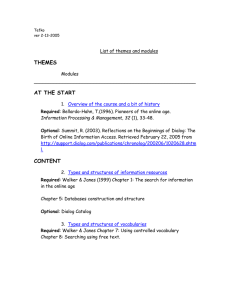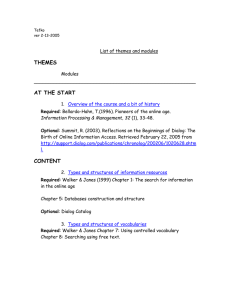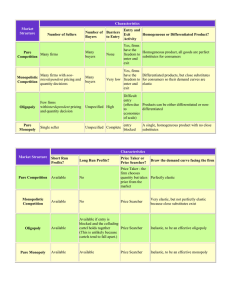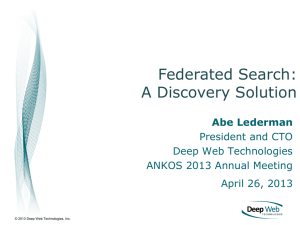How Adolescents Search the Web with Keyword Interfaces: A pilot study
advertisement
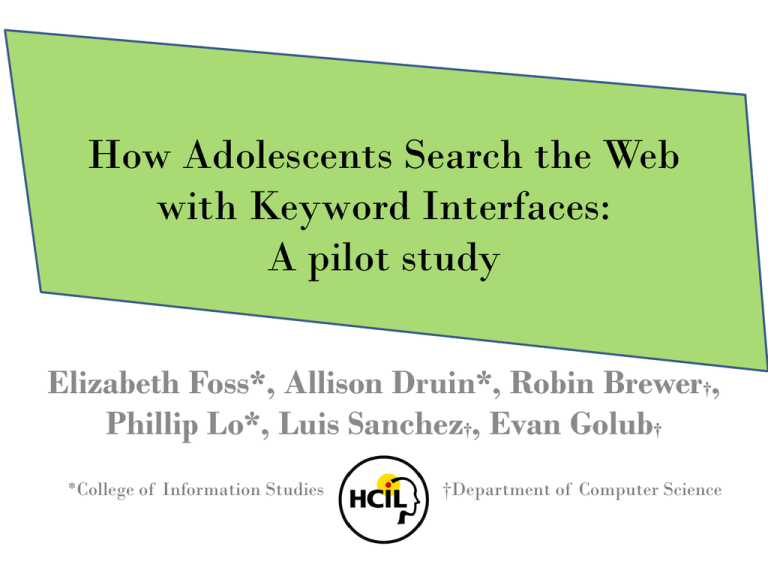
How Adolescents Search the Web with Keyword Interfaces: A pilot study Elizabeth Foss*, Allison Druin*, Robin Brewer†, Phillip Lo*, Luis Sanchez†, Evan Golub† *College of Information Studies †Department of Computer Science The Study Qualitative Study In-home interviews with adolescents Eleven 16-year-olds, 3 Male Questions regarding general computer use and affect Five search tasks, ranging in difficulty and agency Data Analysis Examined the Search Task portions of the interviews for 4 aspects: Flow Artifact Culture Sequence (Beyer and Holtzblatt, 1998) Roles Developing Searcher Domain-Specific Searcher Power Searcher Non-Motivated Searcher ______________________________ Distracted Searcher Visual Searcher Rule-Bound Searcher Roles Developing Searcher Domain-Specific Searcher Power Searcher Visual Searcher Doubting Searcher Social Searcher Non-Motivated Searcher Rule-Bound Searcher Developing Searcher • Difficulty when facing multi-step search task • Limited knowledge and use of search engine tools • Unplanned, wandering search paths • Focused on search tasks • Perceive themselves as advanced users Domain-Specific Searcher • Expertise in specific content area of interest • Expertise does not transfer to general searching ability • Influenced by family Visual Searcher • Prefer to look for information using images or video • Verbally discuss videos and images • Widely influenced by friends, school, and siblings • Broadly triggered to searching by personal interests, school, music, events, and conversations Non-Motivated Searcher • Minimally engaged during interview, limited verbal response • Unfocused, distracted search behaviors • Physically distant from the computer • Shortest possible, most efficient search paths • Only triggered to search by school Rule-Bound Searcher • Searching is dictated by a set of rigid guidelines • Display trust in their searching patterns • Double-check results • Rate themselves as less skilled at early ages • Report outside influence when describing how they learned to search; from school or by watching friends Power Searcher • • • • • • Confident, verbal Use of search engine tools Self-report advanced use at a young age More influenced by fathers than other roles Some report no frustrations with the computer Have programming abilities Power Searcher Differences from younger children: Natural language queries Higher overall level of expertise Doubting Searcher • Asking clarifying questions • Rate themselves as less skilled • Report social use of the computer as a favorite activity • All report influence from school and spend more time searching for school • Heavily female Social Searcher • Use of social networking or communication sites • Instigating conversations with other people on and offline while using the computer • Broadly triggered to search by images, music, conversations, personal interests, and school Druin, et al., 2010 Role Connections Conclusions • Some search behaviors are more permanent, while others develop later • Educators, parents and designers can use search roles as guide to promote search literacy – Teach skills of Power Searchers to all – Social searching for adolescents – Use domains as access points to motivate search Future Work • Full study with 15 and 16-year-olds, 80 planned participants. • How to truly challenge more expert searchers? • Comparative analysis with data from younger children. Acknowledgements Thank you to the participating families! This research was made possible with a Google University Research Grant. References • Beyer, H., and Holtzblatt, K. Contextual Design: Defining Customer-Centered Systems. Morgan Kaufmann, San Francisco CA, USA, (1998). • Druin, A., Foss, E., Hatley, L., Golub, E., Guha, M.L., Fails, J., and Hutchinson, H. How children search the Internet with keyword interfaces. In Proc. IDC 2009, ACM Press (2009), 89-96. • Druin, A., Foss, E., Hutchinson, H., Golub, E., and Hatley, L. Children’s roles using keyword search interfaces at home. In Proc. of CHI 2010, ACM Press (2010), 413-422. • Smith, M., Milic-Frayling, N., Shneiderman, B., Mendes Rodrigues, E., Leskovec, J., Dunne, C., (2010). NodeXL: a free and open network overview, discovery and exploration add-in for Excel 2007/2010, http://nodexl.codeplex.com/ from the Social Media Research Foundation, http://www.smrfoundation.org.
